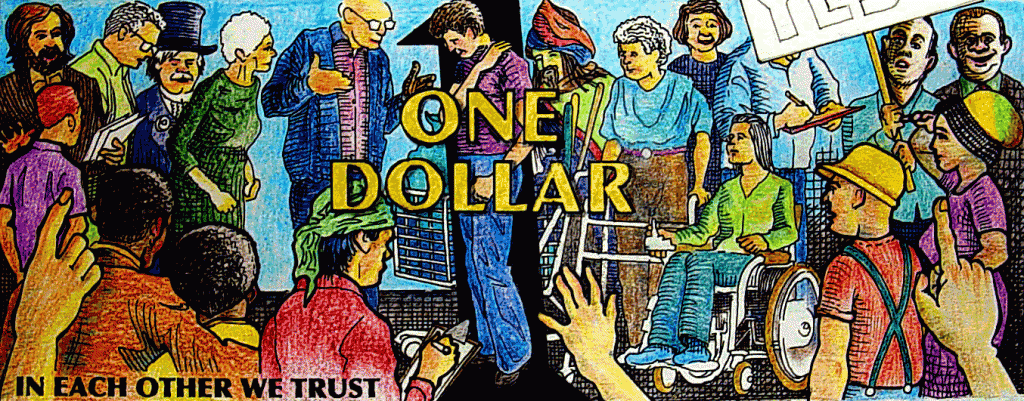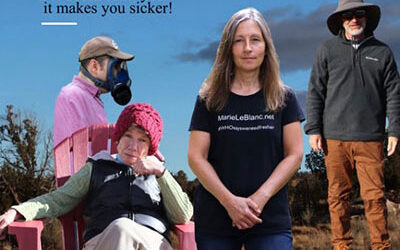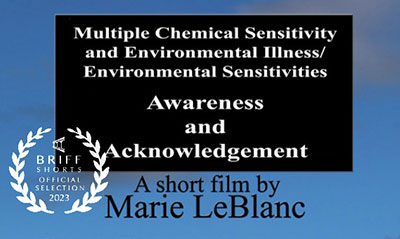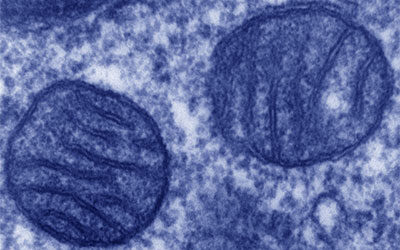by Aurora Levins-Morales

Humboldt Community’s 1 Dollar Bill by artist Bob Filbey
A Thrivalist Strategy for the Sick and Disabled
A proposal for a 21st century hunter-gatherer economic model for the chronically ill, incorporating ideas from traditional micro-businesses and small women’s cooperatives, the local currency movement, transition towns and other creative ideas.
1: Chiripa Economics
Chiripa is a Spanish word that means a stroke of luck. In the Puerto Rican countryside where I grew up, it meant those little bits of money that dribbled in from odds and ends of jobs or little businesses. In that time and place, women had little direct access to cash. The coffee, banana and citrus crops were sold by men, and men controlled the money. But many women had tiny businesses generating little income streams: a neighbor gathered daisies from our farm and sold bouquets, several made the cubes of frozen juice called “limbers” and sold them to school children for a penny, other baked cakes, hemmed dresses, sewed school uniforms, made candy or grew hot peppers to sell to their neighbors.
Chiripa economics is the modern equivalent of hunter-gatherer economies. Hunter-gatherers move through the landscape, taking advantage of whatever happens to be in season, knowing where resources are likely to be found, but drawing from many different sources, and flexible enough to take advantage of unexpected windfalls. Chiripistas are traditionally people who are economically marginalized, lack the capital to start full-sized businesses, or are mothers busy with childrearing and lack the time. Whatever their circumstances, chiripistas make use of a variety of skills to “harvest” small quantities of income from a variety of little ventures.
For people with chronic illnesses and disabilities that keep us out of the job market, the chiripa work style has many advantages. Like traditional chiripistas, we are economically marginalized and lack capital. But because of exhaustion, pain, and the immense amount of attention our self-care requires, we’re also short on energy and time, and usually can’t maintain full time work. An economic life that has small, separate parts can be more easily adjusted to our fluctuating capacity than a single full or part time job. Chiripa economics also allows us to diversify. We can have several micro-businesses that require different skills and levels of energy, activities that are seasonal, and let us rev up for a short while, then rest, jobs that can be done slowly, at our own pace, products we can make as we’re able, without quotas.
2: Collectivizing the Effort
I grew up in a rural Caribbean culture which is much more communally oriented than most of U.S. culture. Privacy and individual achievement were less valued than community involvement. I also grew up in a communist home (the root is the same as communal, common, community) and so I always look for ways to make individual struggles become group projects. Sharing a struggle makes it easier on everyone. Effort and costs can be spread out, and the feeling of solidarity, of being in it together, makes a huge difference to morale.
In 2007 I had a stroke ad received rehab both in the U.S. and Cuba. In the U.S., besides having access to a very limited number of sessions, patients were separated by curtains, each in our own private space. We weren’t supposed to know hat anyone else’s disability or injury was, or what rehab they were doing. The excruciating work of desensitizing my raw nerves and regaining the use of my right side happened in private and it was exhausting and discouraging. In Cuba, everyone worked in one room. We knew all about each other’s cases, because the therapists talked openly about what they were doing with each person. We could watch each other’s efforts, make eye contact and encourage each other while we worked, and encourage each other when things got hard. My rehab sessions were almost 40 hours a week, but I was much less tired and was in much better spirits. Our individual recovery was still our own responsibility, but it felt like a group project. We were all going to fight to reach our goals together.
U.S. culture heavily promotes the idea of individual achievement and individual success or failure. Although we have a strong history of cooperatives, collectives, intentional communities, barn-raisings and other communal strategies, that tradition has been suppressed. In hard times like the ones we’re in now, we’re expected to sink or swim on our own, and the societal message is that those who sink just don’t have what it takes to live. Collectivizing our economic struggles helps to dispel the myth that poverty is a personal failure. Sharing the stories of our efforts to survive, and pooling our skills and resources to help each other and ourselves is a consciousness raising process that makes it clear how little our difficulties have to do with our personal qualities.
Oppressive systems always try to make the oppressed think that the reason they’re oppressed is that they’re defective. One of the great gifts of being a teenager in Chicago during the early second wave feminist movement was getting to be part of a big collective process of women sharing the stories of our lives, comparing notes and reframing what our experiences meant. Because I essentially grew up in feminist consciousness raising groups, I knew that what was hard in my relationships or my school life, how I was treated at work or in the healthcare system, the inequities of heterosexual sex or the dangers of gendered violence were none of them the result of character flaws, not my fault. I could see that sexism made those things hard. For sick and disabled people, collectivizing our economic struggles can help us stay clear that the level of difficulty in our lives is not the result of personal failure: oppression makes things hard.
Chirpistas often work alone, but sometimes they gather into small cooperatives. To make food, clothing, crafts, repair bicycles, grow new crops, manufacture wheelchairs, cut hair, raise hens. Cooperatives can get group loans, share tools and the costs of marketing, and members can keep each other company and build something together, ending isolation and boosting morale.
Although it varies based on individual circumstances and local levels of access, many chronically ill people and some disabled people are not physically able to gather in one place in order to work together. For sick people whose energy levels can fluctuate dramatically, managing to all have energy at the same time is close to impossible. In the past, communal survival projects have also depended on being in the same geographic area. In order to be part of an intentional community or a collective business, you usually have to move there. People in our constituency don’t have that flexibility. We depend on networks of support in the places where we’ve settled, have extremely varied environmental needs and don’t have the financial margin to allow us to easily relocate.
The climate of blame, internalized shame about our struggles, discouragement, lack of resources, inability to relocate, diverse and often contradictory physical needs, fluctuating capacity, and sheer exhaustion have all made it hard for the sick and disabled to collectivize. I’ve spent years trying. But modern communications technology makes it possible to create non-geographic intentional communities, cooperative businesses and networks of support like this one.1 Modern technology could allow us to build cooperative chiripa-based ventures, working from our own beds and desks, but sharing skills, access, money, knowledge, connections and encouragement.
3: Transition
As we face a growing global crisis of capitalism, an energy crisis with the approaching end of oil reserves and the escalating environmental crises of climate change, contamination of water, land and air, and genetic modification of the food supply, with the threat it poses to all plant reproduction, to name the most obvious challenges, many people are coming up with creative ways to prepare for dramatic change. The Transition Town movement “is a grassroots network of communities that are working to build resilience in response to peak oil, climate destruction, and economic instability. ..founded (in part) upon the principles of permaculture2.”
Local currencies, some of them developed in connection with Transition Towns, “aim to raise the resilience of local economies by encouraging re-localisation of buying and food production.”3 People can exchange labor outside the dollar economy, restoring value to abilities the marketplace may not value. The Common Good Bank extends that idea by trying to integrate “a fast-growing mutual credit system with a new type of bank account, so that community-centered decision-making, money-creation, innovation, cooperation, and economic justice can connect seamlessly to the current mainstream economy,” creating a transition banking system.4
The technical expertise and inventiveness of often right-wing and highly individualistic survivalists, combined with progressive movements around food justice, community-based medicine and collective housing are giving rise to what I call a “thrivalist” movement, whose goal is not just individual and family survival, but collective thriving, in the midst of disastrous circumstances. Principles of permaculture are being applied in many creative ways. Barter, community and backyard gardens and other cashless ways of meeting our needs are all making a comeback.
The sick and disabled are especially vulnerable in times of economic crisis. The resources we depend on become unreliable, social programs and public services are cut, infrastructure begins to break down, opportunities for work become more scarce, the health care system less accessible and more costly. Power shortages make everyone’s lives harder, but for us, they can be catastrophic, even life-threatening. They can deprive us of necessary medical equipment, leave us housebound and isolated, and make it difficult for us to maintain safe environments. Sick and disabled people need to be part of designing the transition strategies for our communities. We can also begin designing our own shared strategies.
One possibility is to create our own communal currency, based not on geographically local community, but on a shared set of challenges. Local currencies are a way to keep resources within a community. Instead of being backed by gold reserves or other capital, they’re backed by the creativity, skills and energy of a community of people. Crip currency could help to build resources among the sick and disabled by allowing us to put resources back into supporting each other. We can create value according to our own standards, exchanging skills that the crashing marketplaces doesn’t value but that we do.
Many of the local control strategies being developed in geographic communities could also work in a virtual community of chronically ill and disabled people. Paul Glover, the founder of the highly successful Ithaca Hours currency, has written a book about creating health cooperatives and “self-insuring” as a community. Ithaca has one of the few medically integrated free clinics in the country, specifically for the uninsured.5 I went to graduate school at a “university without walls,” a geographically dispersed graduate school that allowed students to learn at home, and had faculty spread out across the country. What if we created a virtual, geographically dispersed free clinic without walls for uninsured and underinsured chronically ill and disabled people?
With our chiripa collectives, crip currency and free clinic without walls, we could also encourage the development of thrivalist technology and projects especially beneficial to our community. We could become our own spread out transition town.
4: Practice
What does this mean in practice, right now? I can see multiple possible starting points, based on the passions and needs of the people I’m personally connected to. First of all, we can share our stories, look at what our common and unique struggles are and see what we can learn from each other about survival strategies. Interested people could form teams to:
- Look into business structures for a chiripa cooperative for sick and disabled people, where we engage in individual micro-businesses, but are part of a legal entity that can seek financing, share the costs of professional services and marketing, share a website (sort of like Etsy for artsy entrepreneurs) and pool our skills.
- Research the possibility of adapting the local currency model to our geographically dispersed community. Read Paul Glover’s book on creating local currencies. Share the cost of a consult with an expert. Find out more about the Common Good Bank.
- Research the possibility of a free clinic without walls. Read Glover’s book about that, and consult with experts.
- Create a skills bank database for sick and disabled people, which could be used for barter and could be the basis for a later currency project.
- Create a needs bank database of the kinds of goods and services we need access to, including those that don’t yet exist.
- Start a list of specific concerns for our people as we face economic and environmental crisis.
To participate in this conversation, please leave a comment below or contact Aurora at aurora@historica.us.
 Aurora Levins-Morales is a writer, an artist, a historian. She’s also an activist, a healer, a revolutionary. She tells stories with medicinal powers. Herbalists who collect wild plants to make medicine call it wildcrafting. Aurora wildcrafts the details of the world, of history, of people’s lives, and concentrate them through art in order to shift consciousness, to change how we think about ourselves, each other and the world. Find out more about Aurora at her website auroralevinsmorales.com.
Aurora Levins-Morales is a writer, an artist, a historian. She’s also an activist, a healer, a revolutionary. She tells stories with medicinal powers. Herbalists who collect wild plants to make medicine call it wildcrafting. Aurora wildcrafts the details of the world, of history, of people’s lives, and concentrate them through art in order to shift consciousness, to change how we think about ourselves, each other and the world. Find out more about Aurora at her website auroralevinsmorales.com.
NOTES
1Sick and Disabled Queers on Facebook
3Wikipedia
4commongoodfinance.com/about-us
5paulglover.org/hdbook.html “Take control of health costs by self-insuring as a community. Explains how to start a local health co-op, based on the author’s experience starting the Ithaca Health Alliance.”










Thanks so much. I’ll be contacting you! I can’t think while I’m on the computer so it’s hard for me to say something interesting while typing. I’ve been thinking about something like a ChipIn project, but chipping in small amounts of our time instead of money. I can spend so little time on the computer. I’ve been thinking about how can people with electrical sensitivity contribute and be part of a community such as you describe above. Then I went on your website and saw you were looking for a contribution from a solar expert. My boyfriend is so ES that he can’t use a computer at all, but he is an expert on solar systems for those disabled by MCS and EHS. We all have something to contribute, just have to work on finding it sometimes.
Dear Aurora,
I love the concept and thank your for putting it out there for us!